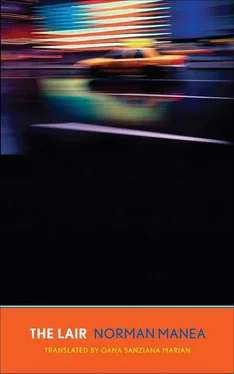Gora was listening, silently. Probably smiling.
“Do you think I’m ranting? I’m talking about the Mavrodoiu Church in Pitesti. Do you still remember where Pites,ti is? In the south of the Homeland, not in the Habsburgian Transylvanian north that was home to the Ga  pars, nor the Habsburgian north of Bukovina, which had the honor of bringing into the world the mathematician and philosopher Mihnea Palade and my cousin Augustin Gora. We’re cousins, aren’t we? Through alliance and semi-alliance and discrepancy. In Pitesti, then, in the south, where there were Roman legions brought from Palestine, Hebrews who impreg-nated the local women and propagated the race. Did you know that? Of course, you knew it.”
pars, nor the Habsburgian north of Bukovina, which had the honor of bringing into the world the mathematician and philosopher Mihnea Palade and my cousin Augustin Gora. We’re cousins, aren’t we? Through alliance and semi-alliance and discrepancy. In Pitesti, then, in the south, where there were Roman legions brought from Palestine, Hebrews who impreg-nated the local women and propagated the race. Did you know that? Of course, you knew it.”
Gora is silent.
“Anyway, that’s my insomnia, my dilemma. Do I go back to the church of the deaf-mutes, or do I stay here, in the exile hospital? I hope you understand, so that you can help me decide. And there’s something else. The new language of the deaf-mute church has facilitated two interpretations for some sacred texts. Parallel words, just as Palade had dreamed. What more can you ask for; what, what, tell me, Professor.”
Ga  par isn’t waiting for an answer, he’s merely breathing deeply.
par isn’t waiting for an answer, he’s merely breathing deeply.
“Do you vote? I need to know, it’s important for my decision. You’ve been here for twenty years. Surely you’ve already voted a few times. Have you voted? With the elephant or the donkey? For whom does the bewildered citizen vote? Here voting is important, not like back in our homeland.”
“Yes, it is. Too few vote.”
“No one is interested in politics. The government is called the Administration. Wonderful! The building administration! And there are no identity cards, just drivers’ licenses! Whom did you vote for?”
“I didn’t vote. I’ve never voted in any election.”
“Why?”
“When the electoral campaigns begin, you have the sensation that you’ve stumbled upon a children’s playground. The voters cry, skipping, hugging each other, putting on masks, chanting. The candidates seem like robots, reciting slogans. It’s a little frightening. No skepticism whatsoever.”
“Democracy! All the rights in the world. The right to stupidity, as well, of course. It’s important! Very important. No one shuns you, no one eliminates you, you’re human. For-mi-da-ble!”
A long, narrow room with metallic walls and a floor made of silver metal. A long, metallic cage, without windows. In the back, at the far end of the office, a metallic table. Behind it, a rusted, metallic armchair. In front of the table, and on the sides, silver chairs.
At the table, the general. Tall, massive, white mustache and black hair. A brownish uniform; wide, golden epaulets with three large stars. Medals on his chest. The jacket and khaki shirt unbuttoned. Heat, as though from the inside of a kiln.
He presses the button on his desk; there’s a ring; the metal door opens; two guards introduce Lu, each one holding her by an arm. They cross the distance from the door to the metallic desk with light, small steps. The detainee is deposited into the chair in front of the general; the soldiers come to attention, salute, do an about face; the metallic door closes without a sound behind them.
The general considers the detainee. Like a Russian princess. Short, fur overcoat, long, black knee boots. A peasant’s kerchief, old and torn, covers her face.
Lu keeps her head down, holding herself in her short overcoat, shivering. Delicate green gloves protruding from the sleeves with the grayish cuffs. The gloved hands tremble; Lu clutches herself, clenching, in the fur that’s too short.
The bell rings long and violently, like a siren, three times. The general is stiff in his chair; the detainee, stiff in her own.
The door doesn’t open. The general stands up, waiting. He hurriedly buttons the front of his shirt and jacket.
At last, the metallic door opens gently to the side. A thin, little man in a silken, striped prisoner’s uniform, striped cap over his shaved head, enters stealthily into the room. Heavy, thick, silk, elegant pajamas, with a skullcap, the beret of a wealthy retiree. On his feet, slippers made of felted fabric.
The general clicks his heels in a military salute, comes out from behind the armchair, moves respectfully to the side, making room for his superior.
The little man sits hastily in the general’s armchair, and the general moves to the chair to the left of the detainee. The chief pulls a golden pen from the shirt pocket of his pajamas, extends it to the general, pushes a thick, black folder across the desk in the general’s direction.
He smiles at the detainee, who doesn’t raise her head. “We know each other, don’t we?”
She keeps her head down, her gaze on the metallic floor.
“I’d prefer it if you took off that stinking kerchief.”
Lu slowly pulls the kerchief off her shaved head and lets it fall at the foot of the chair. She stares, resigned, at David Ga  par, the cousin of her mother, comrade Serafim. Eva Kirschner’s husband. Peter’s father.
par, the cousin of her mother, comrade Serafim. Eva Kirschner’s husband. Peter’s father.
“I think you know what this is about.”
Having gotten no answer, the prosecutor makes a quick sign to the general, who pulls a pack of Kent cigarettes and a golden lighter out of his breast pocket. He sets them on the desk. David Ga  par pulls out a cigarette, the general lights it, David takes a deep drag, once, three times, with the thirst of someone who’s been kept far away from such pleasures for a long time. The general pushes the ashtray from the edge of the desk toward the center, to the right of the chief.
par pulls out a cigarette, the general lights it, David takes a deep drag, once, three times, with the thirst of someone who’s been kept far away from such pleasures for a long time. The general pushes the ashtray from the edge of the desk toward the center, to the right of the chief.
“You come from a trustworthy family. Your parents were on our Party’s side after, and maybe even before the war. In spite of their bourgeois origins and their wealth, comrades Serafim are people of confidence.”
The general makes notes, conscientiously.
“They’re not the ones in question. Nor their daughter. We’re talking about the fugitive Augustin Gora. The son of former exploiters, owners of vast forests in Bukovina. Your husband.”
Lu looks at him, unmoved, shivering in the too short fur.
The general unbuttons his jacket once again, as well as the buttons to the neck of his shirt.
“Have you divorced this man?”
“No.”
A prompt, whispered answer.
“Hm, that surprises me. I don’t think your parents were too happy with this marriage. Not that. . no, I’m not referring to ethnicity. The Party doesn’t discriminate among people; your family rid itself of the horrors of the ghettos and the arrogance of the chosen people, but I don’t think they approved of the choice. And I doubt they’re happy to have a son-in-law who ran away to the capitalists.
Lu looks at her relative, silently, trembling.
“Maybe Professor Gora thought that he’d received a passport on the merit of his intellect; maybe he hasn’t understood that we gave him the passport. Not because he deserved it, but because that was what we wanted.”
The prosecutor Ga  par emphasized the word we, gazing at the general. The general was writing, concentrating on the paper.
par emphasized the word we, gazing at the general. The general was writing, concentrating on the paper.
“I hope you’re not intending to follow him.”
“No.”
“Very good. This doesn’t, however, excuse you from your duty to us. You’ve refused to answer the questions. You could be accused as an accomplice. Have you decided to answer?”
Читать дальше

 pars, nor the Habsburgian north of Bukovina, which had the honor of bringing into the world the mathematician and philosopher Mihnea Palade and my cousin Augustin Gora. We’re cousins, aren’t we? Through alliance and semi-alliance and discrepancy. In Pitesti, then, in the south, where there were Roman legions brought from Palestine, Hebrews who impreg-nated the local women and propagated the race. Did you know that? Of course, you knew it.”
pars, nor the Habsburgian north of Bukovina, which had the honor of bringing into the world the mathematician and philosopher Mihnea Palade and my cousin Augustin Gora. We’re cousins, aren’t we? Through alliance and semi-alliance and discrepancy. In Pitesti, then, in the south, where there were Roman legions brought from Palestine, Hebrews who impreg-nated the local women and propagated the race. Did you know that? Of course, you knew it.”










